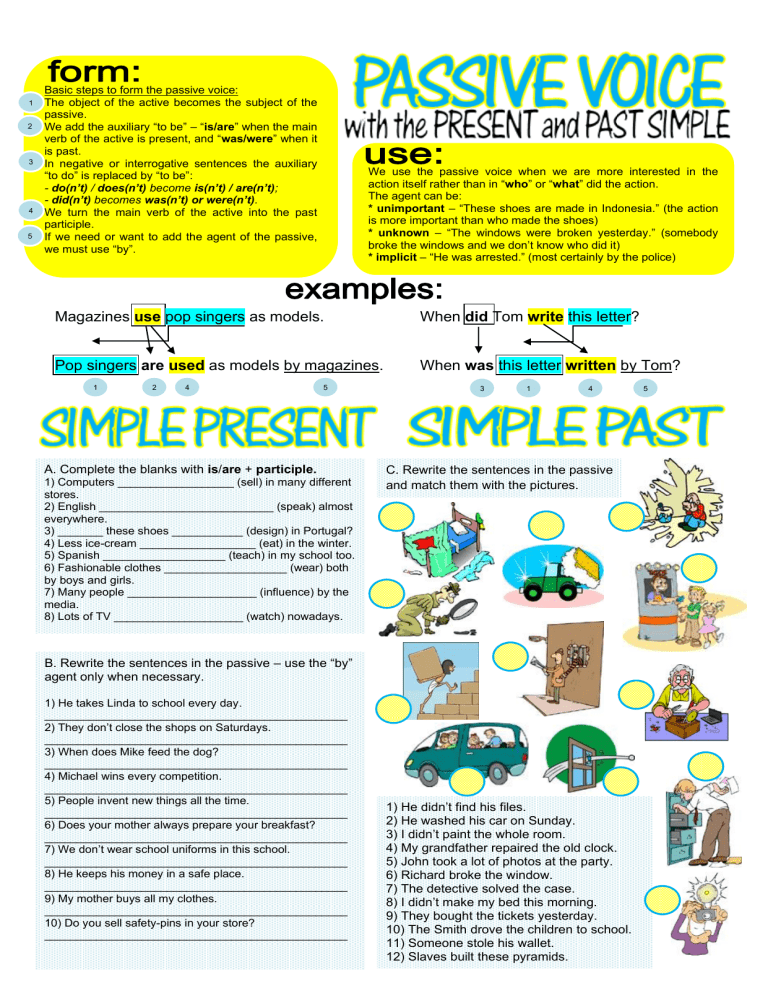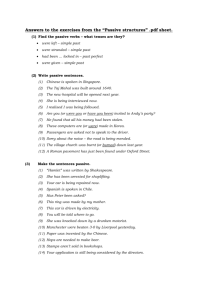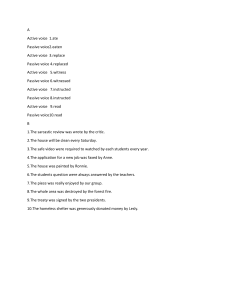
1 2 3 4 5 Basic steps to form the passive voice: The object of the active becomes the subject of the passive. We add the auxiliary “to be” – “is/are” when the main verb of the active is present, and “was/were” when it is past. In negative or interrogative sentences the auxiliary “to do” is replaced by “to be”: - do(n’t) / does(n’t) become is(n’t) / are(n’t); - did(n’t) becomes was(n’t) or were(n’t). We turn the main verb of the active into the past participle. If we need or want to add the agent of the passive, we must use “by”. We use the passive voice when we are more interested in the action itself rather than in “who” or “what” did the action. The agent can be: * unimportant – “These shoes are made in Indonesia.” (the action is more important than who made the shoes) * unknown – “The windows were broken yesterday.” (somebody broke the windows and we don’t know who did it) * implicit – “He was arrested.” (most certainly by the police) Magazines use pop singers as models. When did Tom write this letter? Pop singers are used as models by magazines. When was this letter written by Tom? 1 2 4 5 A. Complete the blanks with is/are + participle. 1) Computers __________________ (sell) in many different stores. 2) English ___________________________ (speak) almost everywhere. 3) _______ these shoes ___________ (design) in Portugal? 4) Less ice-cream __________________ (eat) in the winter. 5) Spanish ___________________ (teach) in my school too. 6) Fashionable clothes ___________________ (wear) both by boys and girls. 7) Many people ____________________ (influence) by the media. 8) Lots of TV ____________________ (watch) nowadays. 3 1 4 C. Rewrite the sentences in the passive and match them with the pictures. B. Rewrite the sentences in the passive – use the “by” agent only when necessary. 1) He takes Linda to school every day. _______________________________________________ 2) They don’t close the shops on Saturdays. _______________________________________________ 3) When does Mike feed the dog? _______________________________________________ 4) Michael wins every competition. _______________________________________________ 5) People invent new things all the time. _______________________________________________ 6) Does your mother always prepare your breakfast? _______________________________________________ 7) We don’t wear school uniforms in this school. _______________________________________________ 8) He keeps his money in a safe place. _______________________________________________ 9) My mother buys all my clothes. _______________________________________________ 10) Do you sell safety-pins in your store? _______________________________________________ 1) He didn’t find his files. 2) He washed his car on Sunday. 3) I didn’t paint the whole room. 4) My grandfather repaired the old clock. 5) John took a lot of photos at the party. 6) Richard broke the window. 7) The detective solved the case. 8) I didn’t make my bed this morning. 9) They bought the tickets yesterday. 10) The Smith drove the children to school. 11) Someone stole his wallet. 12) Slaves built these pyramids. 5 1 2 3 4 5 Basic steps to form the passive voice: The object of the active becomes the subject of the passive. We add the auxiliary “to be” – “is/are” when the main verb of the active is present, and “was/were” when it is past. In negative or interrogative sentences the auxiliary “to do” is replaced by “to be”: - do(n’t) / does(n’t) become is(n’t) / are(n’t); - did(n’t) becomes was(n’t) or were(n’t). We turn the main verb of the active into the past participle. If we need or want to add the agent of the passive, we must use “by”. We use the passive voice when we are more interested in the action itself rather than in “who” or “what” did the action. The agent can be: * unimportant – “These shoes are made in Indonesia.” (the action is more important than who made the shoes) * unknown – “The windows were broken yesterday.” (somebody broke the windows and we don’t know who did it) * implicit – “He was arrested.” (most certainly by the police) Magazines use pop singers as models. When did Tom write this letter? Pop singers are used as models by magazines. When was this letter written by Tom? 1 2 4 5 A. Complete the blanks with is/are + participle. 1) Computers __________________ (sell) in many different stores. 2) English ___________________________ (speak) almost everywhere. 3) _______ these shoes ___________ (design) in Portugal? 4) Less ice-cream __________________ (eat) in the winter. 5) Spanish ___________________ (teach) in my school too. 6) Fashionable clothes ___________________ (wear) both by boys and girls. 7) Many people ____________________ (influence) by the media. 8) Lots of TV ____________________ (watch) nowadays. 3 1 4 C. Rewrite the sentences in the passive and match them with the pictures. B. Rewrite the sentences in the passive – use the “by” agent only when necessary. 1) He takes Linda to school every day. _______________________________________________ 2) They don’t close the shops on Saturdays. _______________________________________________ 3) When does Mike feed the dog? _______________________________________________ 4) Michael wins every competition. _______________________________________________ 5) People invent new things all the time. _______________________________________________ 6) Does your mother always prepare your breakfast? _______________________________________________ 7) We don’t wear school uniforms in this school. _______________________________________________ 8) He keeps his money in a safe place. _______________________________________________ 9) My mother buys all my clothes. _______________________________________________ 10) Do you sell safety-pins in your store? _______________________________________________ 1) He didn’t find his files. 2) He washed his car on Sunday. 3) I didn’t paint the whole room. 4) My grandfather repaired the old clock. 5) John took a lot of photos at the party. 6) Richard broke the window. 7) The detective solved the case. 8) I didn’t make my bed this morning. 9) They bought the tickets yesterday. 10) The Smith drove the children to school. 11) Someone stole his wallet. 12) Slaves built these pyramids. 5 KEY A. 1) Computers are sold in many different stores. 2) English is spoken almost everywhere. 3) Are these shoes designed in Portugal? 4) Less ice-cream is eaten in the winter. 5) Spanish is taught in my school too. 6) Fashionable clothes are worn both by boys and girls. 7) Many people are influenced by the media. 8) Lots of TV is watched nowadays. B. 1) Linda is taken to school every day. 2) The shops aren’t closed on Saturdays. 3) When is the dog fed (by Mike)? 4) Every competition is won by Michael. 5) New things are invented all the time. 6) Is your breakfast always prepared by your mother? 7) School uniforms aren’t worn in this school. 8) His money is kept in a safe place. 9) All my clothes are bought by my mother. 10) Are safety-pins sold in your store? C. 1) He didn’t find his files. His files weren’t found. 2) He washed his car on Sunday. His car was washed on Sunday. 3) I didn’t paint the whole room. The whole room wasn’t painted. 4) My grandfather repaired the old clock. The old clock was repaired (by my grandfather). 5) John took a lot of photos at the party. A lot of photos were taken at the party (by John). 6) Richard broke the window. The window was broken by Richard. 7) The detective solved the case. The case was solved (by the detective). 8) I didn’t make my bed this morning. My bed wasn’t made this morning. 9) They bought the tickets yesterday. The tickets were bought yesterday. 10) The Smith drove the children to school. The children were driven to school (by the Smith). 11) Someone stole his wallet. His wallet was stolen. 12) Slaves built these pyramids. These pyramids were built by slaves.

